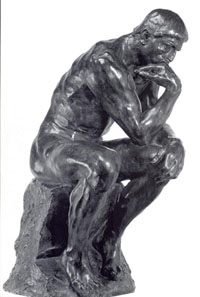|
With a deep passion for learning and knowledge, Chris is an avid enthusiast of mathematics, computer science, physics, philosophy of mind, and economics.
If you have any questions or comments about what you read on this website, feel free to email him at: NoSpam@ChristopherLind.Com (Replace NoSpam with Chris)
|
How to Make Decisions
Being Led by the Spirit of God
By C.R. Lind

Your life…what it will have been about, the significance that it had, will be a direct result of the decisions that you make. A decision is a choice between 2 or more possible courses of action, and the word decision itself comes from the Latin word decisus, which means to cut off from, any other possible course of action.
“Decision determines direction, and direction determines your final destination or destiny.” – Tony Robins
Most animals have no choice in the actions that they take…their actions are entirely determined by their instincts. Human beings are different. We have free will, the ability to freely choose the actions we take. Paradoxically, there is one action we cannot freely choose to take, and that is the action of choosing not to decide. “If you choose not to decide, you still have made a choice”.
We have no choice in this. Every action that we take must be preceded by a decision. As a result, one of the chief human problems is that of deciding what to do.
Interestingly enough, science is fundamentally incapable of answering this question for you. You, as a decision maker, must be the ultimate and final authority when choosing how you will live. Nobel Prize winning physicist Richard Feynman explains why.
In Feynman's words: "The common human problem, the big question is 'Should I do this?' It is a question of action. What should I do? Should I do this?"
The problem of decision making can be broken down into 2 more fundamental parts or problems.
The first part asks, "If I do this, what will happen?"
The second part asks, "Do I want that to happen".
The first part can be answered by science or experience. The solution is to "Try it and see what happens".
However, the answer to the second part CANNOT be answered by science or experience. Just knowing what the result of an action will be DOES NOT tell you whether or not you should take that course of action. Knowing what the result of an action or decision will be does not answer the question of ethics, "Should I do this?"
Feynman further states "...Science cannot tell you how to make a decision...science cannot tell you whether or not something is Right or Wrong...or whether you should or should not do something…and NO AMOUNT OF EXPERIENCE EVER CAN…”
For example, when deciding whether or not to eat, many people base their decision on the fact that if they do not eat, they will feel hungry or weak. Well, how do you know if you
There are many other ways to go about making decisions in life. You could make decisions based upon your emotions, or how you feel. For example, when most people feel hungry, they eat. When most people feel pain, they take action to stop what is causing the pain. But using feelings, emotions, and sensations of pain and pleasure as your sole guide for making decisions suffers from the same problem as using science, logic, and reasoning as your sole guide when making decisions…you are still stuck with the question, “how do I know this is what I want or know this is how I ought to behave”.
This inner knowing or sense of the actions you ought to take is called your conscience. Your conscience is your guide in making the right decisions in life.
Your conscience is part of your mind, and your mind, which is not part of your brain or any other physical process, is part of your spirit. Your conscience is that inner voice…that sense or knowing about what you ought to do or how you ought to act.
Your conscience is God telling you what you ought to do, how you ought to act.
Webster's dictionary defines conscience as: "the sense or consciousness of the moral goodness or blameworthiness of one's own conduct, intentions, or character together with a feeling of obligation to do right or be good"
Consciousness is defined as: "the quality or state of being aware especially of something within oneself"
Becoming conscious of your conscience is your first step in good decision making. Logic, reasoning, risk analysis, emotions, and feelings are but tools to assist in the decision making process…they themselves are fundamentally incapable of answering the question, “should I do this”. Only your conscience is capable of answering this question.
You can freely choose to ignore God…ignore your conscience and the sense of the way you ought to behave. All crimes are instances of people freely deciding to ignore their conscience, their sense of right vs. wrong. All crimes are bad decisions.
So a conscience is an inward knowing, or sense, about what is right or wrong.
In fact, your conscience is the ONLY way for you to have knowledge about what is right and wrong. No amount of experience or scientific insight can ever provide this.
Your conscience is the foundation of good decision making. It is also the foundation of Law, government, and ethics. The bible says that God writes His law of right and wrong on our hearts.
Going further
The new testament of the Bible describes in detail about how to be led by the Spirit of God. A big part of this is learning
to pay attention to that still, small voice you get inside...your conscience.
Listening to the Spirit Led Life series by Keith Moore helped me tremendously. This series is available as a free
audio download at www.moorelife.org.
Scroll down to "spirit led life" towards the bottom of the page.
|
|